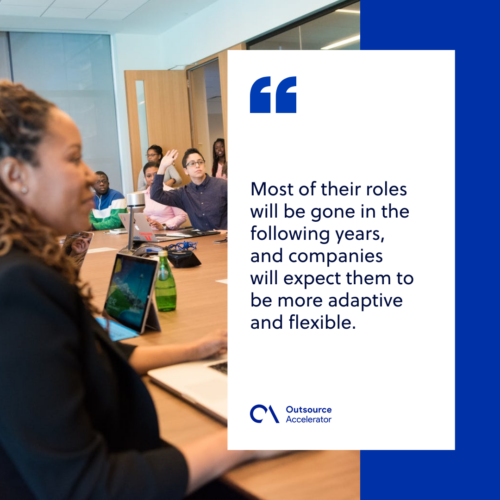Employment trends that will shape the workplace in the new decade

Global employment continues to change over time. It continues to be influenced by aspects such as technology, politics, and regulations bound by industries.
With this, employment trends constantly exist and change. The COVID pandemic even resets some of these trends, making hiring professionals and employers rethink the way they work.
Luckily, there’s still time to apply these trends in their workforce. Get to know the employment trends that would shape the global workplace for decades and how they will affect everyone in this comprehensive guide.
Employment in the new normal
Several employment trends have been existing for the past decade. The COVID pandemic only helped highlight them, giving importance to each aspect that companies once looked over.
As the world slowly reopens, companies continue to embrace remote and hybrid work. Most employees at the same time show interest in hybrid work arrangements, enabling them to work from their homes and an office.
Global employment also picks up with this pace. Calls for better diversity and hiring processes are urged for local employers. More businesses, meanwhile, have settled into either hiring a freelancer or delegating their services offshore with the rising employment costs and expenses.
While the future could be bright for work and employment worldwide, there are still old and new challenges the global employment market could face.

Several employment challenges the world faces
The “Great Resignation” added new worries to global companies in terms of managing their employees. As workers resign and ask for better conditions, companies are forced to increase their costs — and find better ways — to employ people.
This has added to (and further influenced) several other employment challenges that employers face nowadays, such as:
Global talent gap
The global talent gap even widened with the pandemic and will increase in the future. Studies estimated that the talent gap would even grow from 3% in 2020 to 11% by 2030.
Several factors affect this gap. With automation becoming more available, it was expected to eradicate more non-core work, making some jobs more irrelevant. The increase in automation also calls for workers to upskill and stay relevant.
Another factor for this could be the increasing employment demands, being the cause of the great resignation. Companies are forced to compete and increase their employment benefits for certain roles as employees quit en masse.
Reaching out to qualified talents
Aside from the talent gap, companies also find it difficult to reach out to qualified employees. Usually, an employee with impressive skillsets has recruiters contacting them regularly, while someone with rare skill sets is already considering a few offers.
This leaves them the option to contact passive candidates. To get noticed, businesses put extra effort into establishing their name and convincing these passive candidates to accept their job offers.
Establishing employer brand reputation
Companies that maintain a good employer brand attracts better candidates easier. Research from Glassdoor indicates that employer brand helps companies make more quality hires.
Businesses can establish their employer brand in two easy steps: By being a good employer and promoting their work culture.
Today, being a good employer is not just reminding employees that they “are a family.” It connotes providing a good work environment with adequate pay and benefits to their employees.
Having a good work environment helps companies promote their work culture through social media and their website easier with the help of their employees.
Practicing fair recruitment
Admittedly, recruiters find it challenging to hire diverse candidates due to their unconscious biases. Though, virtual recruitment during the pandemic helped improve this aspect, even for a while.
Research in 2020 states that 70% of applicants want to work for employers showing commitment to diversity and inclusion. Even with remote work helping improve diversity, some employees and job seekers still wonder if this will continue as they return to the office.
Global organizations still have a long way to practice diversity and fairness in recruitment. On the bright side, this continues to be a focus for employers especially in the new normal.
Health and safety
Companies had difficulties hiring employees physically during the pandemic due to the lockdowns and travel restrictions. At the same time, applicants were afraid to go out and catch illnesses – including COVID.
Now, issues on vaccine mandates have become rampant. Businesses and establishments in the United States, for instance, are confused as to whether they would allow non-vaccinated applicants to get hired and onboard their work.
A growing number of companies now have vaccine mandates for employees and applicants – except for those following the restrictions in Florida.
Employment trends that will shape the workforce
The right talent makes a company maintain its competence and exemplary performance in its industries. With this, employers and hiring managers still have a long way to keep up in terms of managing their workforce and improving their hiring processes.
As the global market changes, new and existing employment trends help companies explore different ways of thinking about their workforce and recruitment strategies.
For 2023 and beyond, experts see the following employment trends emerging.
Demand for soft skills
Soft skills have been increasingly needed in a flexible work environment. Employers now look over how workers unleash their creativity, empathy, and effective communication skills within their teams.
The majority of HR professionals nowadays say that soft skills “matter as much or even more” than hard skills, especially to the company’s success.
However, less than half of global companies know how to detect them. This is why employers now implement metrics and procedures in improving their recruitment processes.
Focus on diversity
Diversity affects huge aspects of managing a workplace. This includes a company’s tactics to fight sexual harassment at work and employee pay gaps.
Most companies now believe that workplace diversity is a competitive advantage to a workplace. However, candidates and employees still think they should do further strengthen this aspect.
In the latest statistics from Glassdoor, more than three out of four applicants (76%) now include workplace diversity as an important factor in reviewing companies and job offers. Who knows, a company might have let a potential talent go due to their lack of diversity.

Automation in the recruitment process
Automation and AI continue to shape companies and improve recruitment processes further.
Since 2017, large enterprises like Unilever tried to use AI to hire entry-level employees and were satisfied with the results. They have been using recruitment tools for three key functions: sourcing, screening, and applicant interview.
At the same time, candidates are reportedly comfortable using automation in answering initial questions throughout the application and interview processes.
Increased work flexibility
Work flexibility belonged to the four key trends that the 2019 LinkedIn talent report expected to shape the workforce in the future. It came alongside the demand for soft skills (91%), anti-harassment policies (71%), and pay transparency (53%).
The LinkedIn report described flexible work as “a perk that’s no longer a perk.” Admittedly, work flexibility is now demanded from companies worldwide, as seen with the spike in remote working due to lockdowns.
Remote work might be a permanent norm even as companies slowly return to the office. However, this could even bring better advantages to their companies.
Predictive analytics
Predictive analytics uses existing data from a current candidate to predict their behavior. It provides accurate results when it comes to credit scoring, store personalization, and even recruitment.
This helps companies restrategize their workforce plans, allowing them to determine each employee’s worth to the organization.
A report by Deloitte in 2018 states that around 85% of companies already know the importance of predictive analytics. However, only 42% of companies have been implementing this.
Increased importance for training and development
Last but not least, employers and workers have emphasized the importance of training and development in the workplace. The increasing use of automation in companies urged businesses to upskill their employees to stay relevant.
What’s more, employees value training as a way to grow with their companies. This further encourages employers to focus more on corporate training tailored to each employee’s learning needs.
How the employment trends will affect us
These employment trends do not just affect a certain group, whether businesses or employees. It affects the whole world in general since everyone contributes to the global economy and society.
Moreso, here are some of the effects of employment trends to the following parties:
Local employees
Even in the new normal, casual work is continued to be wiped out in most industries with the rise of automation. Most of their roles will be gone in the following years, and companies will expect them to be more adaptive and flexible.
This is why local workers have to keep up with the changing trends in hiring. As much as possible, they are required to improve their skill sets to increase their potential and relevance.

Global businesses
At the same time, the future is more digital for global businesses. They would have to focus on improving their processes, from hiring to managing their workers, if they want to stay competitive.
The society
Trends in employment are also a sign that the world has become increasingly globalized. Workers and companies worldwide are increasingly connected, breaking barriers and restrictions brought by regulations within different countries.
This brings more possibilities for everyone to have better options in terms of hiring and employment.
Outsourcing companies
Lastly, outsourcing companies even gain an advantage to these trends in employment. Employers that don’t have adequate resources to hire local employees can hire remote workers and teams through outsourcing in a nearby country or offshore.
Outsourcing companies, in return, get to provide better workforce management and hiring processes to their clients, increasing their reputation in the long run.
One such provider is Outsourced, a leading outsourcing company in the Philippines. It enables companies to expand their workforce without the financial burden of local hiring.
How outsourcing helps improve global employment
Not all businesses can afford to hire in-house workers. While small businesses don’t have enough resources to recruit these teams, the limited availability of suitable talents makes it harder for small and large enterprises.
Through the decades, outsourcing has helped them fill the gaps and challenges in hiring suitable workers. It even helps improve global employment with companies having access to the largest talent pool to tap for their roles.
Most citizens fear that the industry “takes away jobs” for them, which the industry implies otherwise. Through outsourcing, more companies can generate better, higher-quality jobs for their citizens.







 Independent
Independent




